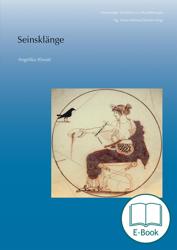By referring to the mythological , physical, physiological and audiocreative composites of music this study addresses the multifacted concept of musical therapie .
Through the verbal realisation of the philosophical concept, it endeavours to achieve a deeper understanding of music in order to comprehend its intrinsic rhythmic principle and form a basis for practical therapy.
Wherein lies the secret of music?
Wherein lie its magical, transformative powers?
What, essentially, is music a s music? - a meaningful event? - a poetic event? - a neurophysiological connection of synapses?
These questions evoke horizons of thought, the exploration of which motivates the author to design a theoretical basis for practical musical therapie.
Her epistemological approach thematises the conditions for the possibilities of experiencing music. The reader is carefully taken along the path of transformation: From the physical acoustic event and its mathematical implications to the physiological and neurophysiological quality of the hearing experience to the psychodynamics of the hearing event as a polar-rhythmic shaping process.
Hearing as a psychoenergetic movement of a creative relationship dynamic which immediately evokes the balance of self-control as a dynamic equilibrium between Outside and Inside is per se therapeutic.
The question of how powerful music is leads to the ancient, but highly relevant Pythagoreanism. Reflecting upon these teachings the author convincingly makes clear that the specific way the problem is presented already constricts.
The classic Pythagorean as well as the modern harmonical approach stick to placing two seperate entities – musical regularity of form and hearing experience - in relation to one another an thus search for a mediating frame of reference which, serving as the logical part of analogy, formally remains a blank space.
Opposing this abstract linkage of topics concerning analogies the author surprisingly takes an unusual turn.
By redefining the transcendental and logical approach of Immanuel Kant`s philosophy a concrete subject-generating paradigm is uncovered.
Music and hearing experience seize to exist as two seperated entities and in original synthesis audio consciousness encroaches on the „subject“ and redefines it.
In light of this new perspective the static and abstract dichotomy of structure and sentiment blends into the vivid area of tension of polar encounters, held together by the clasp of a creative and transcendental consciousness.
Furthermore, the intellectual development takes an interesting turn as the author focuses on a category which is essential for music: „time“ and its intrinsinc system-breaking potential. Thus, the transcendental perspective is organically grounded.
Within the horizon of this new comprehension of time the concept of rhythmicity, created by the field of medical music, is expanded through a qualitative dimension.
The respiration-derivative interdependency between music, musical consciousness and the variable process dynamics of organic functional cycles is seen as psycho-generative.
This approach that understands musical hearing as an integral event of psyche and physique could introduce the project of an autitive psychoenergy to a deeper therapeutic understanding.
Finally, in the ancient myth of „Apollon`s Lyre“, the concept „Seinsklänge/Existential Sounds“ is connected with the archaic knowledge of the existence and meaning of music.
Angelika Alwast completed her German and Philosophy studies in Berlin and Hamburg with the first and the second state examination. She has worked as a secondary school teacher, but has also expanded her skills by attending a seminar for anthoposophic teaching in Kiel, completing training to be a part-time church musician and attending extra occupational training as a musical therapist at the European Academy of Healing Arts in Klein Jasedow (the institution was then working in cooperation with the Univerity for Music and Theatre in Hamburg). Alwast is currently working as a lecturer at the School for Anthroposophic Curative Education Therapy in Kiel, focussing on music and musical education within the curative education context, but also as a choir conductor.
She lives in Bissee near Kiel.


 Table of Contents
Table of Contents